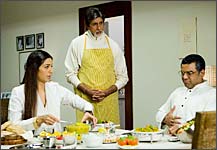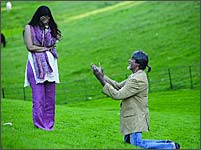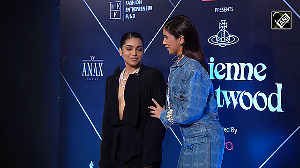Tabu has balls.
Cheeni Kum could have been just another romance between an arrogant old perfectionist and a smitten waif, but the woman here has spirit. She rides the patriarch into a corner, constantly putting him on the spot, and her stoically unblinking, deadpan retorts are a perfect match for her cocksure suitor. That character, Nina, lends the pair contrast, gives it chemistry, makes the film work.
R Balki's debut is, thus, a deftly made May-December love story that ends up being both relatable and romanticised, both honest and hysterical. A mostly delicious repast of repartee and repercussions, the script isn't over-baked and the characters simmered to perfection. Although, for a film with that title, there are indeed a couple teaspoons sugar too many, by the very end.
But we get ahead of ourselves. Lets start from the beginning:
Amitabh Bachchan plays Buddhadeb Gupta, a London restaurateur who prides himself on the finest Indian food. His is a cellphone-free kitchen, where the master believes a perfect biryani is more monumental an achievement than Da Vinci's Last Supper -- the former impacts several more senses. And while his British waiter struggles over the nuances of mouthwatering frontier food names, Buddha's bar serves up magnificent desi dishes to London.
One typical evening, while the ponytailed, preachy perfectionist holds forth to his white-hatted troops on the unbearable lightness of hing, or some such, he gasps at the realisation that a customer has actually sent back a dish. Tabu is the strongwilled Nina Verma, a confident woman currently visiting a friend in London. Buddha storms out and laces the lady with unsubtle sarcasm, laying it on thick and making said friend aghast, leading to the ladies storming out of the restaurant.
Buddha, forced to acknowledge his staff committed a cardinal sin, is compelled to offer an apology, an act he is not used to. Meanwhile Nina, conveniently caught up in London's trademark squall, frequently borrows the chef's umbrella. Romance is obviously -- underscored more than adequately with shots of Tabu walking and turning back (wash, rinse, repeat, repeat) -- in the rainy air, and the days get pleasanter as the wit flies freely and the evident is never quite that.
 Which brings us to the premise: He's 64, she's 34, and all is hunky dory. Except her 58-year-old father, played by Paresh Rawal, who objects to this union in as melodramatic a manner as is possible. Thus, as they say in Bollywood script sessions, 'Conflict.' This results in much chaos, a second-half with far less steam than the pre-interval opening, and a contrived, heavy-handed approach the film really didn't deserve. Add to that a cancer subplot and a nice supporting character turns into an emotionally manipulative angle Cheeni Kum should have done without.
Which brings us to the premise: He's 64, she's 34, and all is hunky dory. Except her 58-year-old father, played by Paresh Rawal, who objects to this union in as melodramatic a manner as is possible. Thus, as they say in Bollywood script sessions, 'Conflict.' This results in much chaos, a second-half with far less steam than the pre-interval opening, and a contrived, heavy-handed approach the film really didn't deserve. Add to that a cancer subplot and a nice supporting character turns into an emotionally manipulative angle Cheeni Kum should have done without.
It's a crisply written film, the dialogue mostly working very well. For all the talk of sarcasm, the lines aren't likely to bowl you over with superb irony, but occasionally a clever gem shines through. The repartee between the lead pair is tight, as are Bachchan's conversations with Sexy, his 9-year-old neighbour played by an impressive Swini Khara -- the former are earnest, as funny as real life often it; the latter tend towards the pithy, but usually stop short of it. It's a very unBollywood script, and it takes some stellar actors to pull it off.
A big wow then to Amitabh Bachchan, the film's marvellous pivot. We shouldn't be surprised by anymore Bachchanism, but the man -- currently, constantly pushing himself onto a limb, decidedly making 2007 his own -- is an undisputable rockstar. His Buddha is smooth yet suffers from occasional social awkwardness, and Bachchan manages both the rough brat and the annoyed old man tones with such ease. He's arrogant and self-assured, yet feels the need to impress her -- while never admitting it. This is one of his finest performances to date, because he sticks to the consistent key of the character, and while the film itself changes genres in the end, he stays Buddha. And is irresistible.
Tabu is a great actress, and with a role that calls for far less bravura than her leading man, she is comfortably understated. As mentioned, their banter runs deep through the film, and her Nina, whom you never know when to take seriously, is a perfect foil to Buddha's don't-ask-the-obvious derision. There is a fantastic moment where she berates Bachchan for being too forward, for daring, like all men would, to ask a girl out and assume she's available, just because she's smiled at him a few times. The tension is palpable as Bachchan falls silent and you wince, suddenly ill-disposed toward her character. 'I do hope you won't be late,' she ends, still deadpan, immediately confirming both date and smirk.
The inimitable Zohra Sehgal plays Bachchan's wrestling-loving mother, a terrible cook who lectures him on gymming and knows him inside out, and is evidently the source of his scornful tongue. Paresh Rawal unfortunately plays the film's sole caricature, an over-written character working more for ha-has than realism, and while the actor is inevitably good enough to make us chuckle, his character needed to be leaner. As mentioned, Swini Khara is pretty good, holding her own in demanding conversational scenes.
 The crackling first half coasts along wonderfully, relying almost solely on Bachchan's formidable charm. The second half sees trouble with a hammy third act.
The crackling first half coasts along wonderfully, relying almost solely on Bachchan's formidable charm. The second half sees trouble with a hammy third act.
Cheeni Kum is a very neat film, but the messy end -- the last three lines of dialogue exchanged by Bachchan and Tabu are the film's very worst -- leaves a peculiar aftertaste.
This isn't a groundbreaking film, but it didn't set out to be. It's a maturely written film with great characters, tremendous performances and some fantastic moments. It could have been perfect, but the lesser said about that end the better.
Watch it. A brilliant sequence involving the chef, a chemist, chhatris and chachas is absolute movie magic, and in itself well worth the price of admission. Bravo.
Rediff Rating: 







 © 2025
© 2025